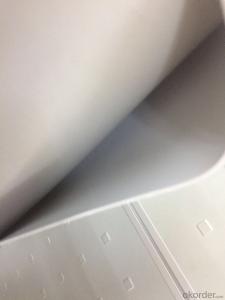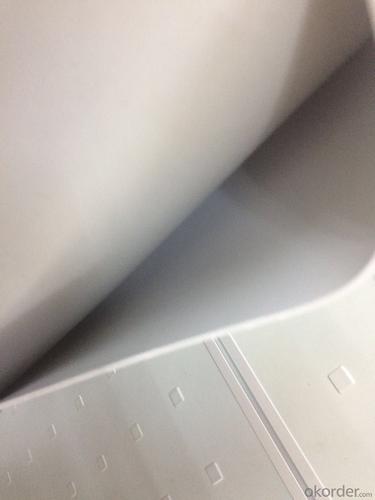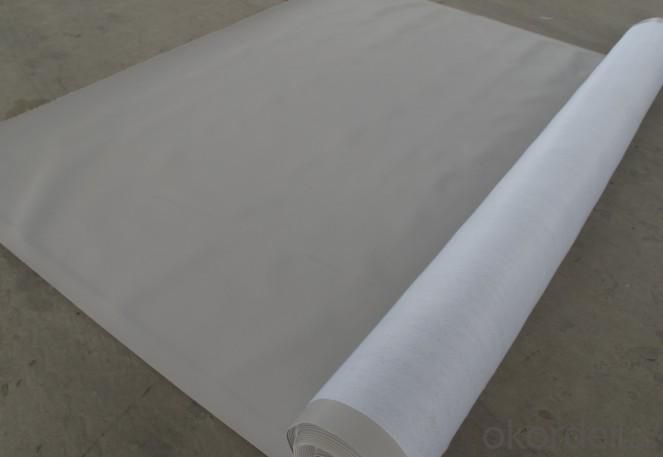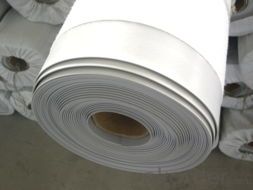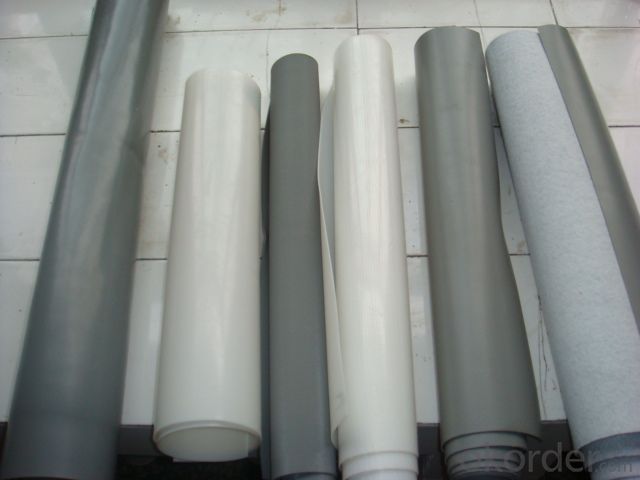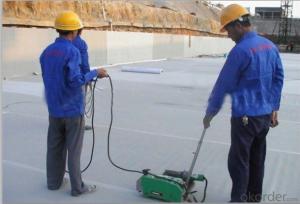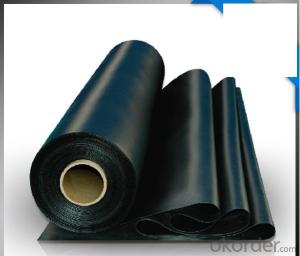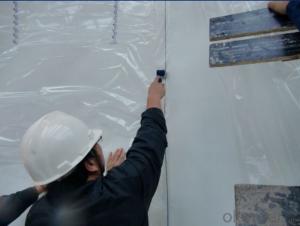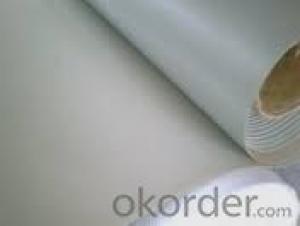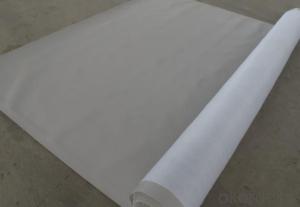PVC Waterproof Roofing Membrane Thickness with 1.5 mm
- Loading Port:
- Qingdao
- Payment Terms:
- TT OR LC
- Min Order Qty:
- 5000 m²
- Supply Capability:
- 10000 m²/month
OKorder Service Pledge
OKorder Financial Service
You Might Also Like
PVC Waterproof Membrane Description:
PVC waterproof membrane is an excellent high quality polymer waterproof sheet, made of PVC resin by adding plasticizer, anti-UV agent, anti aging agent, and stabilizer and other processing aids through extrusion and molding.As the highly recommended product by the Ministry of Construction, it is featured by high tensile strength, great elongation, good stability, small shrinkage, low temperature performances, good resistance to weathering and root penetration, and long service life.
PVC Waterproof Membrane Main Features:
1.Good combination of high elasticity and tensile strength.
2.Fine resistance to static electricity.
3.Excellent resistance to ageing / weathering.
4.Durable,the effective age can be more than 20 years used on exposed surfaces,used on non-exposed surfaces,it can reach 50 years.
5.Fine flexibility at low temperature,adaptable to cold conditions.
6.Root-resistance,can be used on the planting roofs.
7.Fine puncture resistance, joint peel strength and joint shear strength.
8.Fine UV-resistance,no pollution to environment.
9.Easily welding,installing,secure.
10.Easy treatments to the delicate parts of corners and edges.
11.Convenient maintenance with low cost.
Polyvinyl Chloride (PVC) membrane with fiber reinforced layer on the back is widely used in the roofs of civil buildings, tunnels, channels,
FAQ:
Q: Can I visit your company?
A: Yes, welcome to visit our enterprise.
Q: Can I do the third party testing before loading?
A: Yes, we could accept the third party testing.
Q: Which kind of payment in your company?
A: We could accept TT, LC at sight, etc.
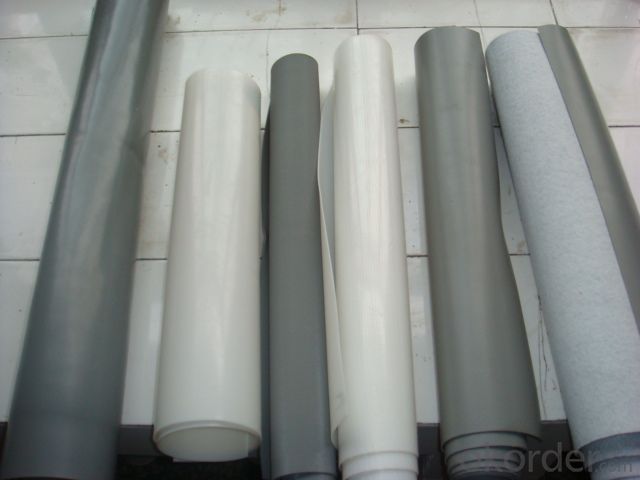
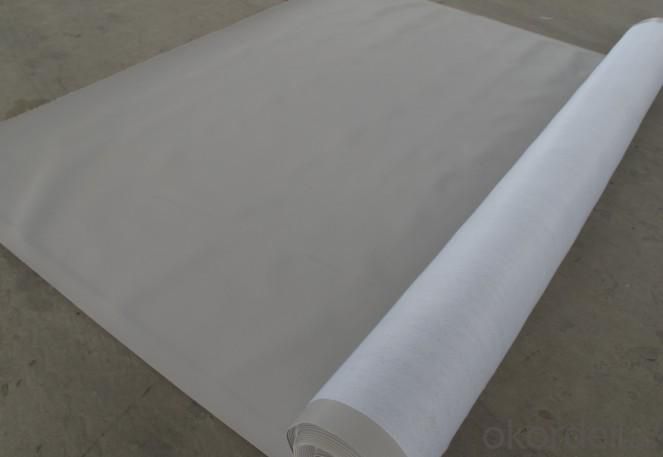
- Q: What is the meaning of the node and the additional layer in the construction of the membrane waterproofing layer?
- The role of the additional layer is to strengthen the protection to achieve double protection to reduce the probability of leakage.
- Q: Does a waterproofing membrane provide any insulation against temperature fluctuations?
- Insulation against temperature fluctuations is not provided by a waterproofing membrane. The main purpose of a waterproofing membrane is to hinder the infiltration of water or moisture into the safeguarded region. It functions as a shield to maintain the structure's dryness and safeguard it from potential water harm. Although it might provide a certain level of thermal resistance based on its thickness and material characteristics, it is not crafted or intended to furnish insulation against temperature fluctuations. In construction, materials such as insulation foam or insulation boards are commonly employed to offer insulation.
- Q: Can a waterproofing membrane be used on hollow core block surfaces?
- Indeed, the utilization of a waterproofing membrane is possible on hollow core block surfaces. Waterproofing membranes are a widely employed measure to safeguard various surfaces against water infiltration and subsequent harm, encompassing surfaces composed of concrete and masonry. Hollow core block surfaces, being constructed from concrete, are not an exception to this practice. The application of a waterproofing membrane onto the exterior of hollow core blocks can effectively shield them from water intrusion and potential damage caused by moisture. This becomes particularly crucial in regions where exposure to water is frequent, such as basements or subterranean structures. However, it is of utmost importance to ensure that the specific waterproofing membrane chosen is compatible with hollow core block surfaces and that proper installation techniques are adhered to in order to attain optimal outcomes and long-lasting protection.
- Q: Does a waterproofing membrane require any special tools for installation?
- Typically, a few special tools are necessary for installing a waterproofing membrane. These tools might include a utility knife or scissors for cutting the membrane to the right size, a trowel or notched trowel for spreading the adhesive or mortar, a roller or squeegee to ensure proper adhesion, a brush or sprayer for applying primers or sealants, and a heat gun or torch for activating self-adhesive membranes. Depending on the specific method of installation and type of membrane, other tools like a nail gun, stapler, or specialized fasteners may also be needed. To determine the exact tools required for a particular waterproofing membrane, it is crucial to refer to the manufacturer's installation guidelines and recommendations.
- Q: Can a waterproofing membrane be used for a basement floor?
- A basement floor can indeed benefit from the use of a waterproofing membrane. These membranes are specifically engineered to halt the infiltration of water, safeguarding the underlying structure. When applied to the basement floor, the membrane acts as a barrier, effectively keeping the surface dry and shielding it from water damage. This is particularly crucial for basements, which are prone to water seepage due to their subterranean location. Furthermore, a waterproofing membrane also aids in curtailing the growth of mold and mildew, as it effectively seals out moisture. It is of utmost importance to select a top-notch waterproofing membrane that is explicitly designed for basement floors and to meticulously adhere to the manufacturer's instructions for proper installation.
- Q: Can waterproofing membranes be used on precast concrete panels?
- Indeed, it is possible to employ waterproofing membranes on precast concrete panels. The vulnerability of precast concrete panels to water intrusion can result in detrimental moisture damage and concrete deterioration. To mitigate this, waterproofing membranes serve as an efficient solution by establishing a barrier between the concrete surface and the surrounding external conditions, successfully thwarting water infiltration. Normally, these membranes are administered on the outer surface of the precast panels, creating a safeguarding layer that thwarts water penetration through the concrete. Through the utilization of waterproofing membranes, precast concrete panels can attain enhanced durability, prolonged lifespan, and heightened resistance against moisture-related predicaments.
- Q: Can a waterproofing membrane be used for an industrial facility?
- Yes, a waterproofing membrane can be used for an industrial facility. It provides a protective barrier against water intrusion, preventing potential damage and ensuring the integrity of the facility's structure.
- Q: What are the different types of waterproofing membranes?
- Construction and building projects commonly utilize various types of waterproofing membranes to prevent water penetration through walls, roofs, or other structures. These membranes can be applied to different surfaces. 1. Bituminous Membranes: Comprised of bitumen, polymers, and reinforcement materials like fiberglass or polyester, bituminous waterproofing membranes are frequently employed in roofing applications. They can be applied using hot or cold processes and offer outstanding waterproofing properties and durability. 2. PVC Membranes: Synthetic PVC membranes exhibit high resistance to water, chemicals, and UV radiation. They are often used in roofing applications, particularly for flat or low-slope roofs. PVC membranes are lightweight, flexible, and easy to install, boasting long-lasting waterproofing protection while being puncture and tear-resistant. 3. EPDM Membranes: Synthetic rubber EPDM membranes find common use in roofing applications. These membranes are highly durable, flexible, and resistant to UV radiation, ozone, and extreme temperatures. They can be installed as a single-ply membrane or in combination with other materials. 4. TPO Membranes: TPO membranes, a type of single-ply roofing membrane, are commonly employed in commercial and industrial settings. Composed of polymer blends and reinforcement materials, TPO membranes exhibit high resistance to water, chemicals, and UV radiation. They are lightweight, flexible, and easy to install. 5. Liquid Applied Membranes: Liquid applied membranes are an application type where the waterproofing system is initially liquid and cures to form a seamless and flexible membrane. These membranes can be made from various materials such as acrylic, polyurethane, or rubber-based compounds. They are often used for below-grade applications like basements or foundations, as well as roofs or other surfaces. To ensure effective and long-lasting waterproofing protection, it is crucial to consider the specific project requirements and consult with professionals to determine the most suitable type of waterproofing membrane.
- Q: Can a waterproofing membrane be used for foundation walls and footings?
- Yes, a waterproofing membrane can be used for foundation walls and footings. A waterproofing membrane is a thin layer of material, typically made of rubberized asphalt or polymer-modified bitumen, that is applied to the exterior surface of foundation walls and footings to prevent water penetration. It acts as a barrier, preventing water from seeping into the foundation and causing moisture-related issues such as dampness, mold, and structural damage. The waterproofing membrane is typically applied to the foundation walls and footings during the construction phase, either before or after the concrete is poured. It is important to ensure that the membrane is properly installed and sealed to provide effective waterproofing. The membrane is also commonly combined with other waterproofing techniques such as drainage systems and sump pumps to provide comprehensive protection against water intrusion. Using a waterproofing membrane for foundation walls and footings is a common practice in construction, especially in areas with high water tables or heavy rainfall. It is an effective and reliable method to prevent water damage and increase the longevity of the foundation. Properly waterproofing the foundation walls and footings is essential for maintaining a dry and structurally sound building.
- Q: Can a waterproofing membrane be used in conjunction with green building practices?
- Yes, a waterproofing membrane can definitely be used in conjunction with green building practices. In fact, incorporating a waterproofing membrane into the construction of a green building can help enhance its overall sustainability and efficiency. One of the key principles of green building practices is to maximize energy efficiency and reduce the environmental impact of a building. By installing a waterproofing membrane, the building's envelope can be protected from moisture intrusion, preventing water damage and potential mold growth. This, in turn, helps maintain the structural integrity of the building, reducing the need for repairs and replacements, which can be resource-intensive and generate waste. Additionally, a waterproofing membrane can contribute to better indoor air quality. By preventing water infiltration, it helps create a dry and healthy living or working environment, minimizing the risk of respiratory issues and other health problems associated with dampness. Furthermore, a waterproofing membrane can improve the energy efficiency of a building. By preventing water from seeping into the walls or foundation, it reduces the potential for heat loss through moisture evaporation, thus reducing the energy needed for heating and cooling. This can lead to reduced energy consumption and lower carbon emissions, aligning with the goals of green building practices. It is important, however, to choose a waterproofing membrane that is environmentally friendly and meets green building standards. Look for membranes that are made from recycled or sustainable materials and have low VOC (volatile organic compound) content. Additionally, consider selecting a membrane that is designed for durability and longevity, as this can further reduce the environmental impact by minimizing the need for replacement over time. In conclusion, a waterproofing membrane can be a valuable addition to any green building project. It helps protect the building envelope, improves indoor air quality, and enhances energy efficiency. By selecting an environmentally friendly membrane, the overall sustainability of the building can be further improved.
Send your message to us
PVC Waterproof Roofing Membrane Thickness with 1.5 mm
- Loading Port:
- Qingdao
- Payment Terms:
- TT OR LC
- Min Order Qty:
- 5000 m²
- Supply Capability:
- 10000 m²/month
OKorder Service Pledge
OKorder Financial Service
Similar products
Hot products
Hot Searches
Related keywords
